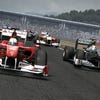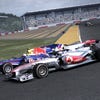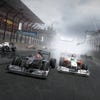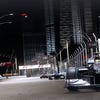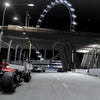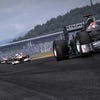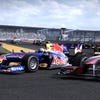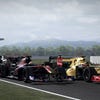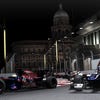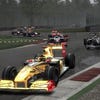Games of 2010: F1 2010
Slick.
But the thing is, it could be, and it was. F1 2010 told utterly gripping stories where it matters - on the track. And it told them on multiple levels: over a lap, a race, a weekend, a season and a whole career.
Codemasters' Racing Studio has long been expert at conjuring track-day atmosphere and drama, both in the hyperventilating excess of GRID and DiRT and in their more reserved, but no less compelling predecessors, TOCA and Colin McRae. Great graphics, combative AI, fun formulae and direct handling are their well-established stock-in-trade.
The developer's new Birmingham team took all these elements, built on them with some fantastically evocative dynamic weather effects, and then married it all to a supremely well-judged interpretation of the F1 race weekend. It's a challenging motorsport that many developers have struggled to make palatable without losing its bite; Codemasters' genius was to give it room to breathe.
At first, the decision to include mandatory practice and qualifying sessions and force a minimum 20 per cent race distance in career mode seemed mad. It does inflate a run through a whole season to epic length. But it's also the smartest thing about the game.
The arc of a race weekend is emphatically conveyed. You progressively master your twitchy hypermachine on a new track, making mistakes, reining it in, learning the rhythm and then tentatively pushing at its limits, whittling down those lap times. Then comes the race where you have to balance your hard-learned consistency with quick responses to changing conditions, and gamble all those precious minutes of smoothness and concentration on one split-second moment of risk-taking.
The structure is both hugely involving, and necessary to the steep learning curve of F1's extreme cars and monumental roster of race tracks. The newer and less familiar designs of ubiquitous track architect Herman Tilke are an education in themselves. They can seem dry on TV, but from the cockpit they offer totally engrossing and surprisingly varied challenges, from the technical posers of season opener Bahrain, through Istanbul Park's thrilling, dust-blown expressway to the exotic sunset spectacle of Yas Marina.
And despite the failings of the game away from the asphalt, this parade of great race weekends - each one a thrilling hour-long gaming episode in its own right - does form a compelling career trajectory. The focus on competition with your team-mate is cute, but the game is shaped by the decision to start you in a lesser team. You can then choose to help develop it or attempt to earn enough reputation (a sort of performance-based XP) to win a better seat.
Starting in a Lotus, fighting tooth-and-nail in the pack in an effort to get your hands on a Renault, and then doing it all again with Ferrari as your goal is a more meaningful and powerful motivator than simply slugging it out with Hamilton for a world championship. It's a journey, it's an adventure, and the grand sweep of it makes every moment of the game more involving.
Racing games are universally terrible at context. Even the best of them structure their fun in ways that are arbitrary, abstract or forced. It's been a great year for the genre, but even the rip-roaring thrills of Blur, Hot Pursuit and Split/Second left little in the way of aftertaste, while the extraordinary Gran Turismo 5 could be mined for moments of unforgettable intensity - but you needed commitment and patience to find them.
F1 2010, on the other hand, draws more from its context than a lot of action and adventure games manage to do. Through a great understanding of both the sport and the timeless, slow-burning love-triangle of driver, car and track, the whole becomes a great deal more than the sum of its parts. It takes you somewhere you've never been before, no matter how often it's been tried: into the body and mind of a Grand Prix racing driver.
That's why my involvement with it was more consistently intense than any other game I played this year. And why, despite the deep familiarity of the sim racing routine, it was something so few other games managed to be: it was new.

